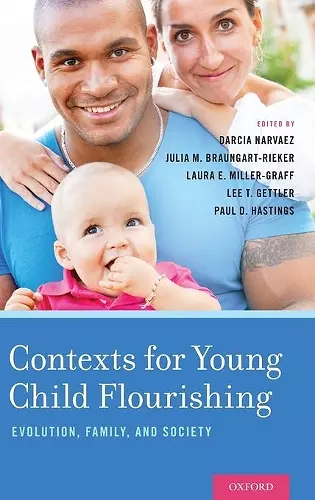Contexts for Young Child Flourishing
Evolution, Family, and Society
Darcia Narvaez editor Paul D Hastings editor Julia M Braungart-Rieker editor Laura E Miller-Graff editor Lee T Gettler editor
Format:Hardback
Publisher:Oxford University Press Inc
Published:18th Aug '16
Currently unavailable, and unfortunately no date known when it will be back

Human beings have the most immature newborn and longest maturational schedule of any animal. Only 25% of the adult brain size is developed at full-term birth, and most of the brain's size and volume is co-constructed by caregivers in the first years of life. As a result, early life experience has long-term effects on physiological and psychological wellbeing. Contexts for Young Child Flourishing uses an evolutionary systems framing to address the conditions and contexts for child development and thriving. Contributors focus on flourishing-optimizing individual (physiological, psychological, emotional) and communal (social, community) functioning. Converging events make this a key time to reconsider the needs of children and their optimal development in light of increasing understanding of human evolution, the early dynamism of development, and how these influence developmental trajectories. There is a great deal of misunderstanding both among researchers and the general public about what human beings need for optimal development. As a result, human nature unnecessarily can be misshaped by policies, practices, and beliefs that don't take into account evolved needs. Empirical studies today are better able to document and map the long-term effects of early deficits or early assets, mostly in animal models but also through longitudinal studies. An interdisciplinary set of scholars considers child flourishing in regards to issues of development, childhood experience, and wellbeing. Scholars from neuroscience, anthropology, and clinical and developmental studies examine the buffering effects of optimal caregiving practices and shed light on the need for new databases, new policies, and altered childcare practices.
"We live now in a social world that is poorly designed for children; and, as a consequence, our children are suffering-even those who are not born into poverty. It's high time that we understand that there is a natural environment for children's healthy development. This book is a wonderful step toward describing that environment and helping us achieve it." --Peter Gray, PhD, Research Professor, Boston College, and author of Free to Learn: Why Releasing the Instinct to Play Will Make Our Children Happier, More Self-Reliant, and Better Students for Life "Narvaez and colleagues have again constructed a tour de force of sensible and revolutionary perspectives on optimal child rearing practices. It is long past time to realize that even near-term infants in utero already have emotional minds, built upon universal affective principles, upon which the rest of the mind is constructed-the cognitive architectures that are unique for each individual. Parents that are sensitive to the realities of their infants' emerging affective minds will help assure optimal development (even fathers talking and singing to their pre-term babies), thereby providing fundamental brain-mind tools that help assure future mental health and happiness. [This book] is an essential guide for understanding and promoting the 'better angels of our nature' through sustained nurture." --Jaak Panksepp, PhD, Professor and Baily Endowed Chair of Animal Well-Being Science, Department of Integrative Physiology and Neuroscience, Washington State University
ISBN: 9780190237790
Dimensions: 137mm x 213mm x 31mm
Weight: 635g
384 pages